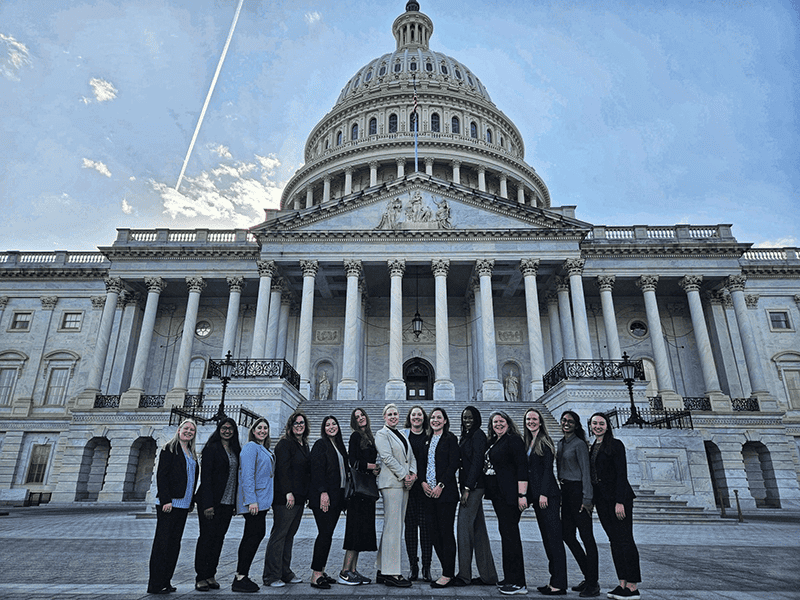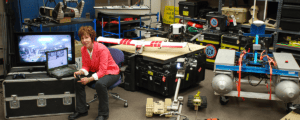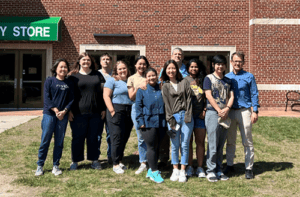In-person outreach with federal legislators is key to advancing the Society’s mission.
By Marsha Lynn Bragg, SWE Associate Editor
In-person advocacy resumed this spring as approximately 130 SWE members and staff converged on Capitol Hill to meet with their respective federal legislators and their staffs. The congressional outreach event had been sidelined for two years after the coronavirus pandemic caused major shutdowns worldwide and restricted in-person interactions and activities.
SWE outreach participants met for two days in Washington, D.C., to continue what SWE is known for: advocating policies that will produce a dynamic and diverse STEM workforce, which includes diversity of ideas and identities.
Karen Horting, CAE, SWE executive director and CEO, was among those in attendance and stressed the significance of in-person outreach. “It was really important for us to be here, because it is important for members’ voices to be heard. It’s also important for members to advocate for STEM policy; it’s important for members to advocate for STEM education, and it’s important for members to advocate for equity in STEM,” she said.
“We can’t do this effectively without our members being there on the Hill to build relationships with congressional leaders; it is not a one-time thing,” Horting said, adding that ongoing advocacy is central to the Society’s mission.
The participants — many of whom were women and first-timers — came from all across the country with the largest contingent from Pennsylvania, Virginia, Maryland, and Michigan. To prepare for their meetings, newcomers and returnees attended a daylong training session coordinated by Della Cronin and Austin Hall, SWE’s D.C. representatives with the Bose Public Affairs Group, an agency that provides logistical support, strategic planning, and outreach for virtual and in-person meetings at the U.S. Capitol.
The training session featured speakers well versed on specific policy issues being considered in Congress and that align with the Society’s objectives; small, state-based strategic planning meetings; and role-playing exercises to help participants shape the personal stories they wanted to share.
Speakers provided policy updates and explained how participants might broach these topics during their scheduled meetings. Ashley Huderson, Ph.D., STEM and CS Equity Fellow with the Department of Education (DE), discussed the recently launched YOU Belong in STEM. The DE initiative is designed to modernize STEM education and to emphasize that all students and educators, regardless of their background or socioeconomic status, have a place in STEM classrooms and careers. “We’re bringing feeling into the science space. How does one feel? Do they feel as if they belong and are welcomed in STEM?” Dr. Huderson said.
Catherine Johnson, staff director for the Subcommittee on Research and Technology in the House Committee on Science, Space, and Technology, discussed research security, Title IX, and STEM education. SWE Associate Director of Research Roberta Rincon, Ph.D., shared current research on women in STEM, noting that the percentage of women with engineering degrees is about 23%, making conversations with congressional leaders about supporting STEM education and funding all the more important.
To give participants an idea of what it might be like in a meeting with their congressional representatives, Hall joined with Joe Herrbach, legislative assistant to Sen. Raphael Warnock, D-Ga., in a role-play exercise to demonstrate how participants might share their personal stories and ask questions, while noting that they would most likely meet with a legislative assistant rather than their U.S. representative or senator. “Don’t be alarmed when you see how young some of these aides are,” Cronin said. “They are very sharp, very smart, and they know the issues.”
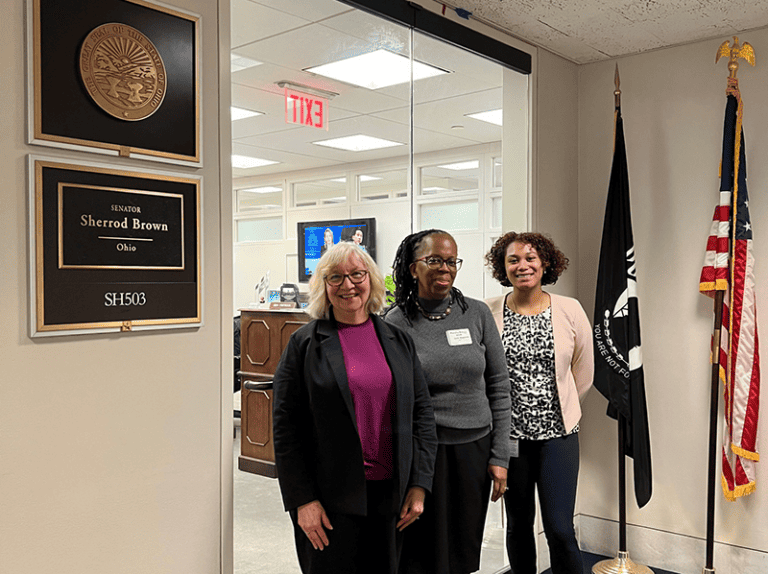
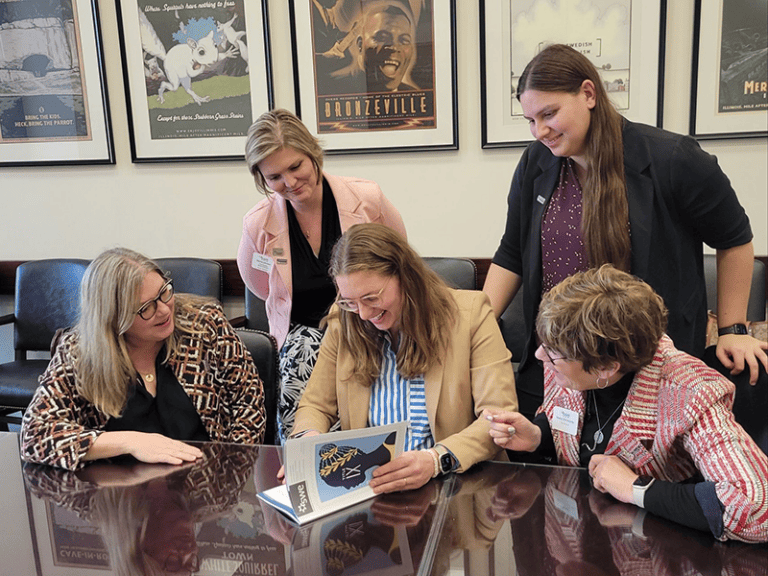
Talking points
Dayna Johnson, P.E., FY23 SWE president, who attended her first congressional visit in 2018, said she was glad to resume the in-person meetings. “I’m incredibly fortunate that my representative worked in a STEM field before deciding to run for office, but the vast majority of legislators do not have a STEM background,” she said.
“SWE members have such a huge opportunity to share stories from our field, especially focusing on what it’s like to be a minority and help educate our lawmakers on the importance of relevant bills and budget requests they are voting on,” Johnson said. “We are truly the experts when we get in those meetings, and we need to exercise our right to share our opinions.”
While sharing personal stories — “why this legislation is important to me” — is persuasive, so is being well-informed on the issues. This year, participants were encouraged to advocate increased funding to the National Science Foundation for the DE’s Aid for Institutional Development, which supports improvements in educational quality, management, and financial stability at qualifying postsecondary institutions, including historically Black colleges and universities.
Other important issues on SWE’s agenda include the STEM RESTART Act (S.662/H.R.1403), a bipartisan bill sponsored by Reps. Chrissy Houlahan, D-Pa., and James Baird, R-Ind., and Sens. Jacky Rosen, D-Nev.; Cindy Hyde-Smith, R-Miss.; and Mark Kelly, D-Ariz. The bill would provide small and medium-sized businesses with funding for paid, midcareer internships known as “returnships” for workers desirous of returning or transitioning to a new STEM career, with priority for women, Black, and Latino STEM professionals and those living in rural areas.
SWE also supports the recently introduced Paycheck Fairness Act (S.728/H.R.17), introduced by Rep. Rosa L. DeLauro, D-Conn., and Sen. Patty Murray, D-Wash. The bill addresses wage discrimination on the basis of sex, which is defined to include pregnancy, sexual orientation, gender identity, and sex characteristics. At this writing, the bill has been referred to the House Committee on Education and the Workforce and the Committee on Oversight and Accountability. On the Senate side, the bill has been read twice and referred to the Committee on Health, Education, Labor, and Pensions.
SWE is optimistic these visits will have a similar positive effect as their advocacy did in the passage of the CHIPS and Science Act in August 2022, which included issues SWE has championed: the STEM Opportunities Act and the Combating Sexual Harassment in Science Act. SWE also asked participants to encourage women legislators in particular to join their respective Women in STEM Caucus formed to bring attention to issues facing women in STEM fields and the federal policies that do or should support them.
“Every year, SWE has a number of items that we advocate for — all of which have a direct impact on diversity in STEM,” Johnson said. “We are excited about the STEM RESTART Act, which would help small and midsized companies run returnships similar to SWE’s STEM Reentry Task Force.”
Horting agreed. “I hope to see the STEM RESTART Act signed into law. I know it will take time. We need more legislators to sign onto it for both the House and the Senate versions. That’s my goal.”

